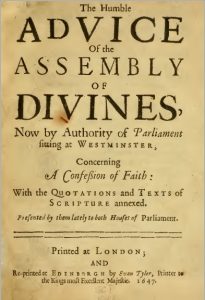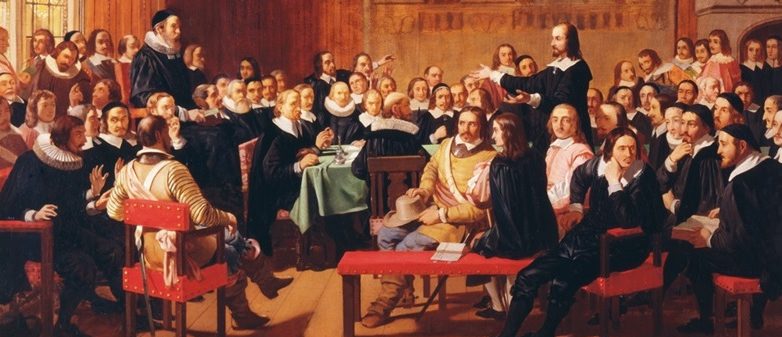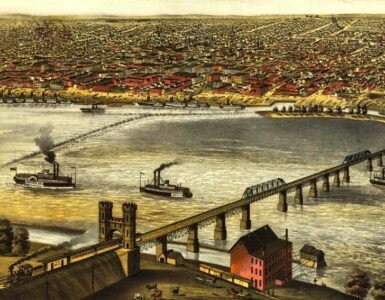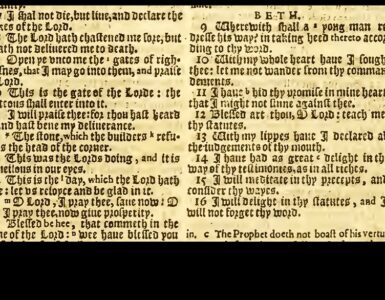 The first line of the Westminster Confession of Faith mentions the insufficiency of the light of nature for teaching the necessity of salvation through Christ as it begins its summary of the doctrine of Scripture.
The first line of the Westminster Confession of Faith mentions the insufficiency of the light of nature for teaching the necessity of salvation through Christ as it begins its summary of the doctrine of Scripture.
Although the light of Nature, and the works of Creation and Providence do so far manifest the Goodness, Wisdom, and Power of God, as to leave men inexcusable; yet are they not sufficient to give that knowledge of God and of his Will, which is necessary unto salvation.…
God’s general revelation to his image bearers through the light of nature, the creation, and by means of his preserving and governing “all his creatures and all their actions” is sufficient to show all people that God is, and he is to be worshipped (WSC, Q 11). Chapter one of the Confession does not begin its summary of the doctrine of Scripture with the Bible, but it instead takes the reader to the sufficiency of Scripture through the insufficiency of the light of nature. Even though the light of nature can convince an individual that God exists, it is insufficient for bringing the person to know the grace of Christ’s redemptive work. There is another use of the light of nature in the first chapter in the sixth paragraph. The light of nature combined with “Christian prudence, according to the general rules of the Word” are to be used for determining some aspects of worship and church government. For example, the Apostle Paul instructed Timothy “to preach the Word” (2, 4:2), but he did not say how long his sermon should be, whether he should stand or sit when speaking, nor did he stipulate that the sermon must have three points. The length of a sermon, the position of the minister when delivering his message, and the organization of the manuscript are all governed by the light of nature, Christian prudence, and general principles from Scripture. Reformed worship follows a form containing essential elements but there is some flexibility regarding how the elements fit together.
Another use of the light of nature is associated with an aspect of the ordo salutis summarized in chapter ten, “Of Effectual Calling.” In paragraph four of the chapter, the insufficiency of the light of nature is expressed with reference to the non-elect and false religions. Only the elect are effectually called. Others may “have some common operations of the Spirit, yet they never truly come unto Christ.” Jesus’ parable of the sower and the seed in Matthew 13 provides two examples of the non-elect appearing for a time to be Christians. The sower distributed seed, which represents the Word of God, and it fell on four soils each of which signifies a response by a hearer of the Word. In two cases—the seed in the rocky soil and the seed in the soil which grew but was choked by thorns—the individuals appeared for a time to be Christians but then they abandoned the faith. As the Confession 10, paragraph 4, expresses it, they had “never truly come to Christ” and thus were not elect. The paragraph goes on to say that those practicing other religions, no matter how diligently they may “frame their lives according to the light of Nature, and the Law of that Religion they do profess,” remain dead in their sin. The sad truth is that no matter how religiously one may follow any one of a multitude of false interpretations of the light of nature, its end always is a way that seemeth right, but its end is destruction. Jesus’ straightforward affirmation of his divinity and salvific purpose expressed in, “I am the way, and the truth and the life. No one comes to the Father except through me” (John 14:6), clearly and simply shows the insufficiency of the light of nature and the necessity of God’s revelation in Scripture for knowing Christ.
Turning to the Westminster Larger Catechism and its discussion of the Law of God in question 151, it affirms that going against “the light of nature” contributes to the “aggravations that make some sins more heinous than others.” Sins against the light of nature are intensified because they are condemned by both general and special revelation; going against one’s innate sense of right and wrong increases the weight and scope of sin. For the Westminster Assembly, the light of nature includes but is not limited to—the certainty of God’s existence, rule, and judgment; the necessity of six days of labor and the Sabbath for worship; the continued preservation and sustaining of the creation by him; man’s inherent general sense of right and wrong; and marriage of a man and woman. All these aspects of the light of nature are sufficient in themselves for God’s purposes but comprehension of their fullness comes only through the illuminated perception achieved as the Holy Spirit speaks through the Word and expresses the depths of the wisdom and knowledge of God. The necessity of worshipping God is clear to all because there are false religions and worship throughout the world seeking to honor him apart from the revelation of God’s will in the Word. The light of nature needs the light of the Word for clarity. God’s preserving and sustaining work are clearly seen in the turning of the seasons, the rain falling on the just and the unjust, and the re-growth of fauna and flora following a meteorological, volcanic, or other cataclysmic disaster. If man had no sense of right and wrong, the world could not endure, and the general sense of right and wrong man has comes through the light of nature. Transgressing the light of nature is akin to a fish trying to swim in air.
BARRY WAUGH
The image of the Westminster Assembly was provided courtesy of Reformation Art.





